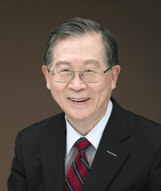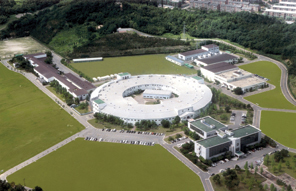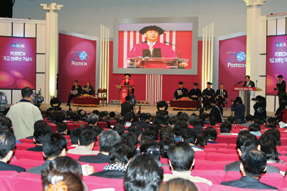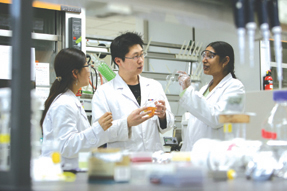POSTECH Sets Its
Sight on Being a
Global University
Strives to make a leap forward toward 'Global POSTECH'
 Pohang University of Science and Technology (POSTECH) is striving to go global as part of its efforts to upgrade POSTECH to the levels of world-class prestigious universities with the goal of evolving into a global top 20 research-oriented university by the year 2020.
Pohang University of Science and Technology (POSTECH) is striving to go global as part of its efforts to upgrade POSTECH to the levels of world-class prestigious universities with the goal of evolving into a global top 20 research-oriented university by the year 2020.
Recognizing the globalization of the campus as an essential task, POSTECH (President Chan-Mo Park) has been adopting such diverse steps as operation of a bilingual campus, an expansion of courses lectured in English, organization of international academic seminars and recruiting of foreign faculty members and students.
Currently, POSTECH has been dispatching about 230 freshmen or 75 percent of the newly admitted students on large variety of outbound programs to prestigious foreign universities every year, while admitting excellent foreign students regardless of their nativity. The university plans to continuously scout foreign gifted research manpower,
 invite foreign professors and expand lectures by foreign emeritus professors with the goal of evolving into a full-fledged world-class university.
invite foreign professors and expand lectures by foreign emeritus professors with the goal of evolving into a full-fledged world-class university.
Serving as a trend-setter in education and research activities, POSTECH has declared the "POSTECH VISION 2020"on the occasion of the celebration of the 20th Anniversary last April with the goal of developing POSTECH into the global top 20 research-oriented university. The vision calls for education fostering creative, progressive and global leaders with science and technology background and continuously generate research achievements with high academic and industrial impact. To this end, the university has been translating into action three strategies designed to accelerate the development of the university: selection and concentration; interdisciplinary cooperation; and globalization.
POSTECH was established on Dec. 3, 1986 as an embodiment of the will to continue rendering greater and broader social contribution in a more systematic manner based on the decision made by Tae-Joon Park, the founding chairman of POSCO and POSTECH.
 rofessors with the goal of evolving into a full-fledged world-class university.
rofessors with the goal of evolving into a full-fledged world-class university.
Serving as a trend-setter in education and research activities, POSTECH has declared the "POSTECH VISION 2020"on the occasion of the celebration of the 20th Anniversary last April with the goal of developing POSTECH into the global top 20 research-oriented university. The vision calls for education fostering creative, progressive and global leaders with science and technology background and continuously generate research achievements with high academic and industrial impact. To this end, the university has been translating into action three strategies designed to accelerate the development of the university: selection and concentration; interdisciplinary cooperation; and globalization.
POSTECH was established on Dec. 3, 1986 as an embodiment of the will to continue rendering greater and broader social contribution in a more systematic manner based on the decision made by Tae-Joon Park, the founding chairman of POSCO and POSTECH. It is the nation's first research-oriented university designed to conduct an in-depth research into sciences essential for the development of the nation and human community, technological theories as well as a wide range of applications and foster world-class gifted manpower with knowledge and intelligence. POSTECH has become a benchmark for Korean universities as it has employed unthinkable steps, including creation of an educational environment surpassing world-class levels, like provision of scholarships and boarding to all students and the nation's highest educational investments since its founding.
The university is proud to have the Pohang Accelerator Laboratory (PAL), the only synchrotron light source in Korea, thus contributing considerably to the development of the nation's basic sciences and cutting-edge technologies. POSTECH also operates 64 affiliated research centers, including POSTECH Biotech Center (PBC), National Center for Nanomaterials and Technology (NCNT) and Pohang Institute of Intelligent Robotics (PIRO),
 and has been establishing itself as a small yet top-notch research-oriented university in Korea with 230 full-time professors, 1,300 undergraduate students, 1,600 graduate students and 700 researchers. Moreover, Graduate Institute of Ferrous Technology (GIFT), world's first institute for graduate-level education and research in the field of iron and steel technology was opened last September, and Technology Innovation & Management (TIM) Graduate Program is set to commence in March.
and has been establishing itself as a small yet top-notch research-oriented university in Korea with 230 full-time professors, 1,300 undergraduate students, 1,600 graduate students and 700 researchers. Moreover, Graduate Institute of Ferrous Technology (GIFT), world's first institute for graduate-level education and research in the field of iron and steel technology was opened last September, and Technology Innovation & Management (TIM) Graduate Program is set to commence in March.
POSTECH has made strides in a short period of time since 1987 when it admitted students for the first time, and it is now competing with international universities, not with domestic ones.
POSTECH has been recognized as a top-level university by diverse prestigious institutions, as the Asiaweek selected POSTECH as the Asia's top science & technology university in 1998 and POSTECH topped a list of Korean universities in surveys conducted by the JoongAng Daily News for the fourth straight year from 2002 to 2005.
 POSTECH's education-research system has set an example to other Korean universities, and it has contributed to upgrading Korea's overall universities one step higher.
POSTECH's education-research system has set an example to other Korean universities, and it has contributed to upgrading Korea's overall universities one step higher.
POSTECH is striving to cultivate the upper 1 percent students into 0.1 percent of science technology leaders under a "small yet talented manpower development policy"designed to yield world-class research outcomes.
On top of that, POSTECH is translating innovative policies on education and research into action.
About 60 to 70 percent of undergraduate students graduating from the graduate school-oriented POSTECH are admitted into its own graduate schools to be educated as core R&D manpower. Undergraduate school education focuses on not only majors but also leadership and humanity nourishment. Thanks to these efforts, most of the graduates have advanced to areas they want to work since its founding, and they are given accolades in the industry and academic circles as out of a small number of 1,200-odd doctorate degree holders from the university, about 250 graduates work as university faculty members inside and outside Korea.
In an effort to better cope with the rapid advancement of science and technology in the 21st Century, POSTECH has inaugurated interdisciplinary courses through School of Environmental Science and Engineering and School of Interdisciplinary Bioscience and Bioengineering in such disciplines as environment engineering and life science where interdisciplinary convergence takes place. The university is adopting the split appointment system under which professors are allowed to assume teaching jobs at two departments, and it plans to expand the system.
In 1998, POSTECH became the first university in Korea to integrate masters and doctorate courses so that excellent students are allowed to concentrate on in-depth research earlier than the normal. As part of its efforts to concentrate on graduate school education, POSTECH plans to operate a program designed to nourish graduate school's expertise, calling for revving up the percentage of doctorate course students in graduate schools to more than 85 percent, and creative dissertations, among other things.
POSTECH is putting more energy into scouting excellent faculty members and making performance evaluations in a bid to recruit and educate excellent students. The university introduced a reformed remuneration package system for faculty in 2004 composing of a base-portion and a performance-portion. It plans to expand the difference in performance-portion among professors from the 7-fold parity in 2006 to the 9-fold one in 2007 to secure quality superiority in research and education.
Outside advisers are utilized to ensure an objective and fair academic evaluation, while the university is adopting such steps to upgrade the faculty to international levels as an expansion of the emeritus system and strengthening of evaluations into professors with tenures. In particular, last September, a department-oriented system was placed to maximize performance and improve efficiency by implementing projects with each department taking the initiative and giving more say to each department head whose term is not limited.
POSTECH, modeled after CALTECH of the United States to focus on the research on basic sciences at the time of founding in 1986, is now working on its own model designed by combining CALTECH and MIT to produce research outcomes with high academic and industrial impact, beyond research on basic sciences and combine basic and applied sciences to step up high-tech-oriented industry-academy collaboration.
In 2005, the number of SCI papers reached 4.4 per professor and the outlay of research projects conducted by the university were worth 435 million won per professor per annum, equivalent to the levels of prestigious foreign universities. POSTECH made a remarked growth in the Citation-Faculty index, a yardstick for gauging the quality of universities'research, as the university jumped from 56th in 2004 to 49th in 2005 and 25th position in 2006 in the Citation-Faculty surveys of universities around the world, conducted by the Times Higher Education Supplement.
In this regard, NSB (NanoSurface Biosciences) POSTECH became the first POSTECH-owned venture company, established last June as part of the university's efforts to transfer and commercialize its technologies based on own research outcomes. POSTECH plans to explore such 10 POSTECH-funded enterprises annually and boost the revenues arising from proprietary technology transfers to 10 billion won within 15 years. nw
An aerial night view of POSTECH campus
President Chan-Mo Park, POSTECH
(from left photo) Pohang Accelerator Laboratory, POSTECH celebrating the 20th anniversary on Dec. 1 and POSTECH Biotech Center.
3Fl, 292-47, Shindang 6-dong, Chung-gu, Seoul, Korea 100-456
Tel : 82-2-2235-6114 / Fax : 82-2-2235-0799